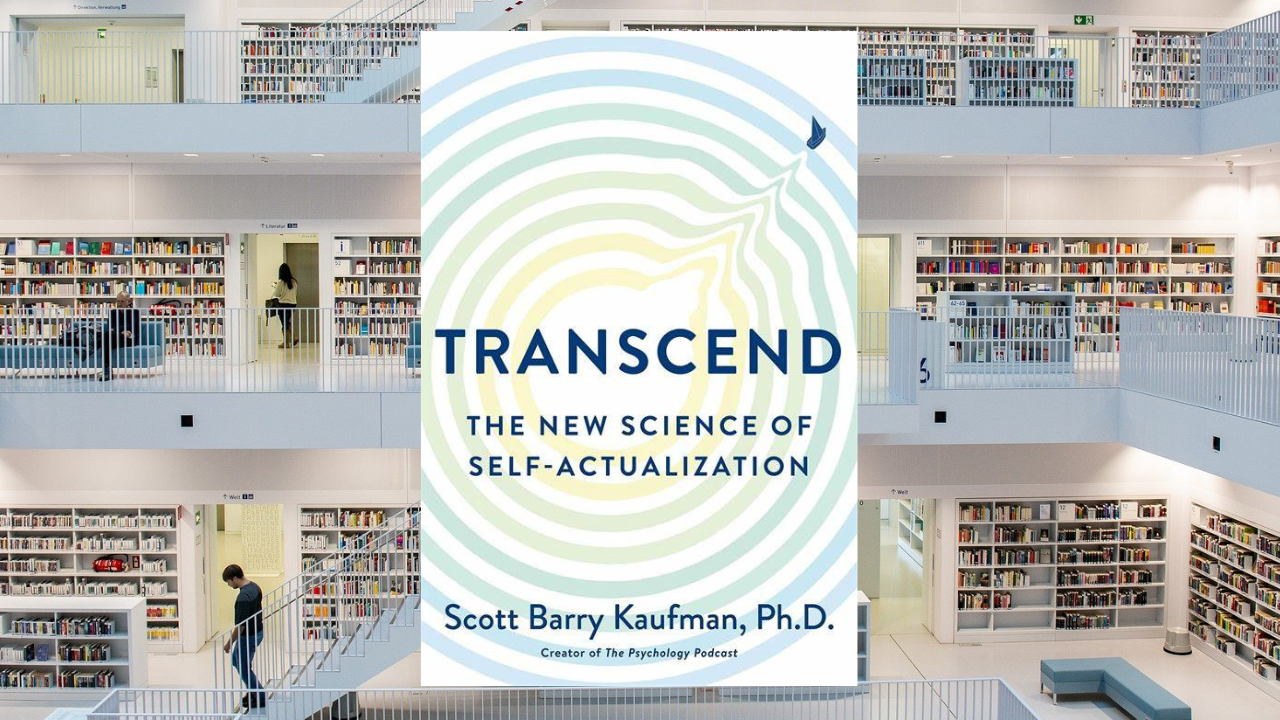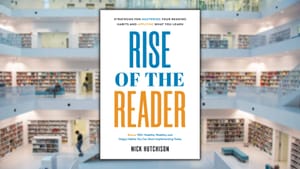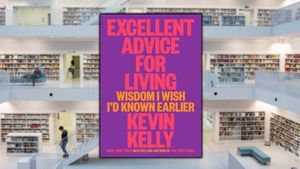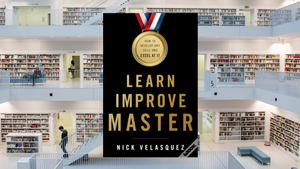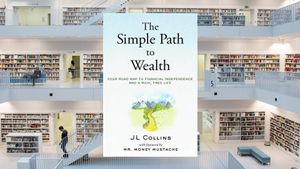
Summary:
Great ideas never die, and although Abraham Maslow passed away in 1970, the currents of his thought have turned into a tidal wave, thanks to the pioneering work of Dr. Scott Barry Kaufman, who has expanded and updated Maslow's ideas for the benefit of us all.
Maslow was an American psychologist who is often credited with hammering out a hierarchy of needs - that same pyramid you were probably made to memorize in school - that includes the basic "security" needs of safety, connection, and self-esteem, and then moves through to the "growth" needs of exploration, love, and purpose.
Well, just like you, I had the proverbial wool pulled over my eyes, because it turns out that Maslow himself never conceptualized his ideas as a pyramid at all! Just when you think you know a person! It turns out that it was actually a brand strategist in the 1960s that came up with the idea of a pyramid, although the details of that origin story are a little hazy.
Nevertheless, at the end of his life, Maslow was working on something radically new, and that's where Dr. Kaufman enters the picture with this spectacular book. It really was one of my knockout reads from 2020, a book that astounded and affected me so strongly that I now recommend it all the time.
In Transcend, Dr. Kaufman shows how, right up until the end, Maslow was extending his world-famous ideas about self-actualization and self-expression and moving into the territory of transcendence, or interconnection between the fates and destinies of every human being alive on Earth.
It's a big vision, but as you can tell from this excerpt from an unpublished draft of what would have been Maslow's next book, The Possibilities for Human Nature, he thought more highly of each of us than perhaps we've ever thought of ourselves:
“If I had to condense this whole book into a single sentence, I think I could come close to the essence of it by saying that it spells out the consequences of the discovery that man has a higher nature and that this is part of his essence. Or more simply, human beings can be wonderful out of their own human and biological nature. We need not take refuge in super-natural gods to explain our saints and sages and heroes and statesmen, as if to explain our disbelief that mere unaided human beings could be that good or wise.”
If someone of Maslow's intellectual stature saw that much goodness and hope latent within humanity as a whole, then we must really be something wonderful!
Indeed, throughout Transcend, Dr. Kaufman gives us a picture of a man so enamored with the possibilities for mankind's development and flourishing that you almost can't help but be swept away by Maslow's ideas. He makes us want to be better than we are.
There's so much to cover here in this breakdown, and honestly, when I choose which books to break down for the Stairway to Wisdom, I gravitate towards books that I wish people would read in their entirety! No breakdown or summary is going to set off the same kind of fireworks display that Transcend set off in my mind, but we're going to cover an awful lot here anyway.
We're going to discuss Dr. Kaufman's alternative metaphor for human needs and goals - a sailboat; we're also going to go over the 13 sources of well-being, the 10 characteristics of self-actualization, and 15 more Key Ideas that add so much stunning depth to this brilliant man who believed so strongly in human potential and goodness.
Transcend includes the latest research in humanistic psychology and draws liberally from unpublished journals and manuscripts that put Maslow's ideas in a whole new beatific light.
Most importantly, we're going to see where Maslow was wrong: the characteristics of self-actualization and transcendence are not nearly as rare as he believed.
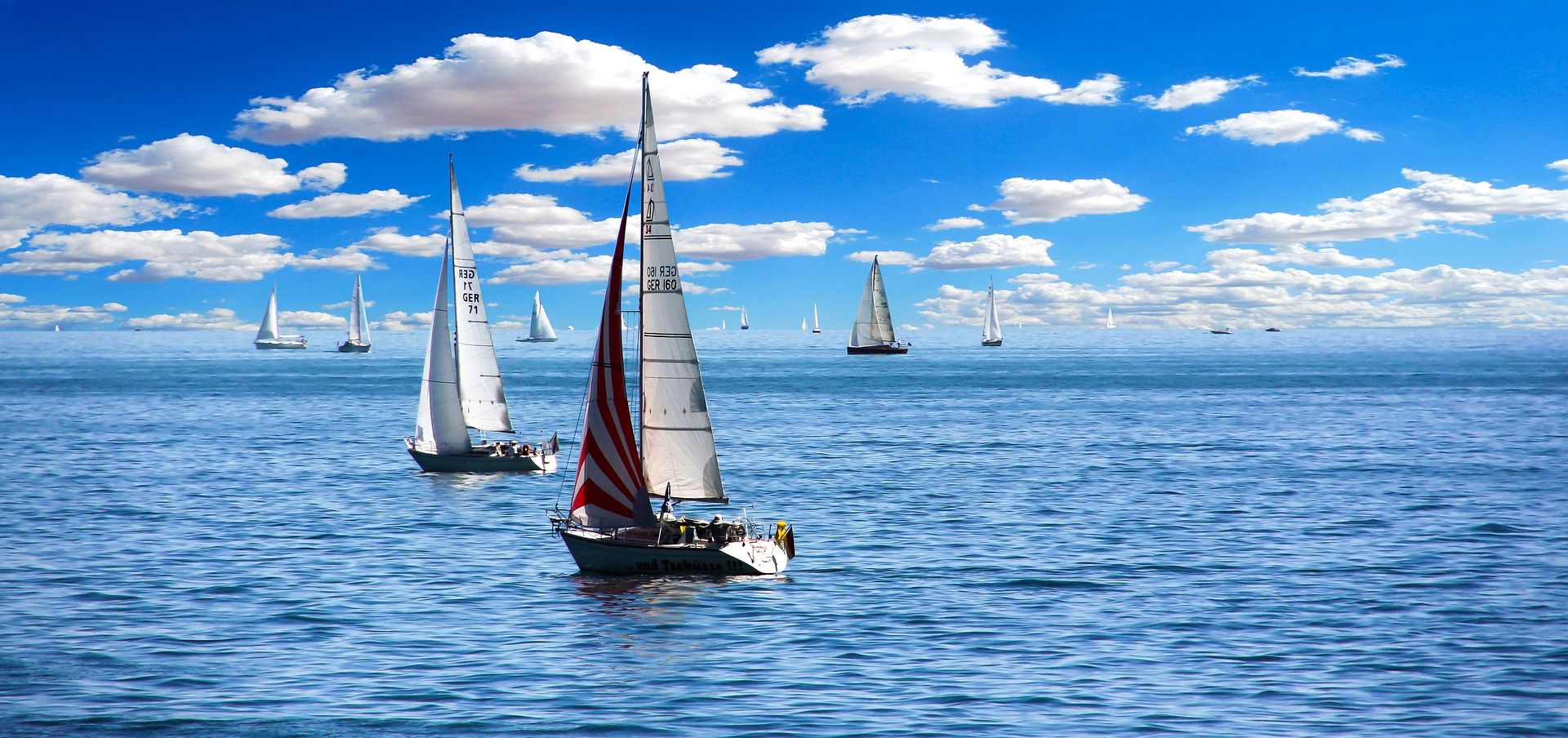
Key Ideas:
#1: "Life isn’t a trek up a summit. It’s more like a vast ocean, full of new opportunities for meaning and discovery but also danger and uncertainty. In this choppy surf, a pyramid is of little use. What we really need is something more flexible and functional: a sailboat."
In Transcend, Dr. Kaufman provides an alternative metaphor for the human needs and goals formerly depicted by Maslow's pyramid. Or, the brand strategist's pyramid - same thing. Anyway, Maslow taught that we are, each of us, perpetually in a state of becoming, and that we can never be said to have "arrived" as a fully-actualized human being.
With that in mind, reaching for the "top" of a pyramid gives one the sense of being "finished," and that's just not how transcendence works; a new metaphor was required. The key is not which "level" you reach, but rather it's about the harmonious integration of one's personality and potential - of everything that goes into becoming a self-actualizing human being.
The ocean represents the entire complexity of living and being alive in the universe, with all its attendant joys, sufferings, and opportunities, and your boat is what protects you from the crashing waves. It is you.
Live long enough, and a ton of bad shit is going to end up happening to you, but if you've got the "security" needs handled - safety, connection, and self-esteem - you're going to be in a much better position to deal with all of that, and even use it to your advantage in facilitating further growth. But with holes in your boat, you can't go anywhere! So it's important not to attempt to ride the waves when you're taking on water. The bigger your boat (the better you satisfy these basic needs) the larger and more powerful waves you can withstand.
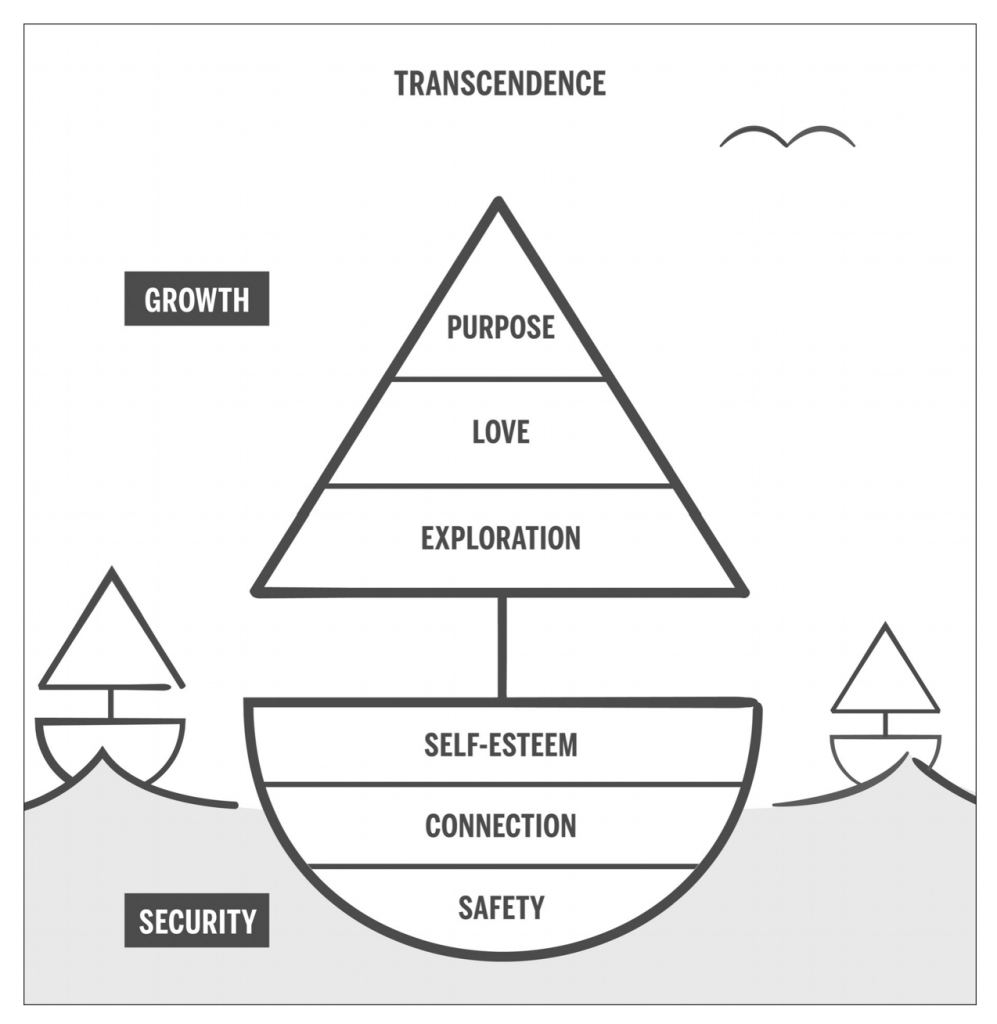
All this is well and good, but boats were never meant to remain anchored at the docks - the whole point is to get out there and explore! To live! As Henry James says in The Ambassadors: "Live all you can; it's a mistake not to." So what's next after we've made ourselves "lifeworthy"?
As Dr. Kaufman goes on to explain:
"Exploration is the driver of all growth, defined by the desire to seek out and make sense of novel, challenging, and uncertain events. While security is primarily concerned with defense and protection, exploration is motivated by curiosity, discovery, openness, expansion, understanding, and the creation of new opportunities for growth and development. The other needs that comprise the sail — love and purpose — build on the fundamental need to reach higher levels of integration within oneself and to contribute something meaningful to the world."
So once you've built your boat, you must set sail. Most important to recognize here is that in order to explore, you must open your sails, open yourself to the fortunes and vicissitudes that guide every human life; and that the more open your sails, the further you're likely to go.
If you really "catch the wind," so to speak, you may even find yourself immersed in transcendent experiences- or peak experiences - that truly are a state of grace and magic made real. In opening yourself up to life, you also raise the tide for others, and your example has the power to lift all boats.
You can read more about the sailboat metaphor here:

#2: “As we sail through the adventure of life, it's rarely clear sailing. The boat itself protects us from seas that are rarely as calm as we would like. Each plank of the boat offers security from the waves. Without it, we'd surely spend all our energy trying to stay above water. While even one plank is better than nothing, the bigger the boat, the more waves you can endure.
Likewise, in life, while safety is an essential foundation for feeling secure, adding on strong connections with others and feelings of respect and worthiness will further allow you to weather the storms. Having a secure boat is not enough for real movement, however. You also need a sail. Without a sail, you might be protected from water, but you wouldn't go anywhere. Each level of the sail allows you to capture more wind, helping you explore and adapt to your environment. Note that you don't 'climb' a sailboat like you'd climb a mountain or a pyramid. Instead, you open your sail, just like you'd drop your defenses once you felt secure enough.
This is an ongoing dynamic: you can be open and spontaneous one minute but can feel threatened enough to prepare for the storm by closing yourself to the world the next minute. The more you continually open yourself to the world, however, the further your boat will go and the more you can benefit from the people and opportunities around you.
And if you're truly fortunate, you can even enter ecstatic moments of peak experience - where you are really catching the wind. In these moments, not only have you temporarily forgotten your insecurities, but you are growing so much that you are helping to raise the tide for all the other sailboats simply by making your way through the ocean."
#3: Dr. Kaufman identifies thirteen separate "sources of well-being" that keep coming up again and again in the psychological literature, and they are: more positive emotions; fewer negative emotions (obviously!); life satisfaction; vitality; environmental mastery; positive relationships; self-acceptance; mastery; autonomy; personal growth; engagement in life; purpose and meaning in life; and transcendent experiences.
You've heard of the 80/20 Rule. Well, you can think of these 13 sources as “the 20% of things that you can focus on” in order to derive “80% of your happiness and fulfillment.” Except, in this case, it’s probably more like 1 percent and 99 percent respectively!
Maximizing these sources of well-being could never completely banish the horrors of pain, suffering, and death which remain inextricable from the human experience, but there’s something comforting about the fact that we all face these horrors together, and that what works for one human being can reliably be said to work for another.
You can read more about the 13 sources of well-being here:

#4: “Within the humanistic psychology framework, the healthy personality is considered one that constantly moves toward freedom, responsibility, self-awareness, meaning, commitment, personal growth, maturity, integration, and change, rather than one that predominantly strives for status, achievement, or even happiness."
A happy life is not necessarily meaningful, and meaningful lives can often be quite unhappy. For example, I consider a life devoted to serving the medical needs of people in developing countries - say, by volunteering for Doctors Without Borders - to be an exceptionally meaningful life, but no one who has spent their entire medical career sewing up machete wounds and hooking up feeding tubes to starving children could be said to lead a happy life.
There has to be something more. And according to humanistic psychology, there is. Within that framework, it's entirely possible (and even desirable) that pursuing a life of meaning, personal growth, and constant evolution will come with an increase in status, a day-to-day experience of happiness, etc. But those would all be subordinated to the real measure of a human life well-lived, which is the degree to which one opens their sails, explores, and assists others in the opening of their sails as well. I'd like to be able to say that we're done with the nautical metaphors, but we'll see...
#5: “The greater the deficiency of these needs, the more we distort reality to fit our expectations and treat others in accordance with their usefulness in helping us satisfy our most deficient needs."
The greater our perceived danger, the greater the degree to which we feel ourselves under threat by life, the greater the temptation to treat other people as means, rather than ends in themselves. Our relationships turn transactional, and how we treat other people becomes distorted by the thought, "how can I get from them what I need to feel secure?"
As you can imagine, this is hardly a recipe for a happy life. Human beings are never to be used as instruments. But in times of scarcity and trial, we just don't have the mental bandwidth to bring our highest selves to all of our interpersonal relationships. That's why it's so important to be strong ourselves so that we can be both strong and open for others.
#6: “I believe the drive for exploration is the core motive underlying self-actualization and cannot be completely reduced to any of the other needs, including our evolved drives for affiliation, status, parenting, and mates."
-Dr. Scott Barry Kaufman
#7: “I do not accept any absolute formulas for living. No preconceived code can see ahead to everything that can happen in a man's life. As we live, we grow and our beliefs change. They must change. So, I think we should live with this constant discovery. We should be open to this adventure in heightened awareness of living. We should stake our whole existence on our willingness to explore and experience."
-Martin Buber, 20th-century philosopher
#8: “We should never have the desire to compose music or create mathematical systems, or to adorn our homes, or to be well dressed if our stomachs were empty most of the time, or if we were continually dying of thirst, or if we were continually threatened by an always impending catastrophe, or if everyone hated us...Obviously, a good way to obscure the higher motivations, and to get a lopsided view of human capacities and human nature, is to make the organism extremely and chronically hungry or thirsty."
-Abraham Maslow, Motivation and Personality (1954)
#9: “Life is best organized as a series of daring ventures from a secure base.”
If you grew up in a secure home, with a fully-stocked fridge and two parents who loved you, then you've pretty much won the cosmic f—ing lottery. Seriously, I mean there's a lot to be said for wealth and prosperity, but the unconditional love of parents for their children is one of the most powerful forces in the entire universe and one of the most secure bases you're likely to find.
The reason for this is that life in the universe is a balancing act between chaos and order, and if it were all chaos and no order, we wouldn't be able to function. We need stability in at least one portion of our lives in order to feel secure enough to brave the uncertainty, volatility, and chaos of the larger world.
Now, none of this is to say that if you didn't have that secure base in childhood, you're unable to develop one later in life. Unconditional love is rare, but it is indestructible and it is a fundamental human capacity. It's just that a secure childhood home is such a massive advantage that transcends any other facticity of one's existence, such as ethnicity or socioeconomic conditions.
#10: “Social isolation has an impact on health comparable to the effect of high blood pressure, lack of exercise, obesity or smoking.”
The scientific literature on this is fairly extensive by now: if you're socially isolated from the rest of society, without a supportive personal network made up of people who love and care about you, you will die earlier. I don't think I can put it much more clearly than that.
#11: “I think of the self-actualizing man not as an ordinary man with something added, but rather as the ordinary man with nothing taken away.”
Of course, Maslow means women as well! This is one of my favorite quotes of his too because it gets at the truth so perfectly - transcendence isn't limited to a chosen few, but rather it's another fundamental human capacity, right alongside the expression of unconditional love.
He means here that self-actualization - growth, exploration, transcendence - is only obscured by the clouds of the ordinary; it's always shining, it's just that we can't always see it when we're stuck inside the everydayness of human life.
#12: Characteristics of Self-Actualization: Truth-Seeking, Acceptance, Purpose, Authenticity, Continued Freshness of Appreciation, Peak Experiences, Humanitarianism, Good Moral Intuition, Creative Spirit, and Equanimity.
#13: “It’s striking just how many of the characteristics of self-actualizing people that Maslow proposed almost seventy years ago can be reliably and validly measured. Nevertheless, Maslow was way off base about one important thing: the characteristics of self-actualization are not nearly as rare as he believed."
It's hard to think of Abraham Maslow as a pessimist, but compared to Dr. Kaufman, he just might be! I'm half-kidding of course, but in Transcend, Dr. Kaufman makes the case that self-actualizing individuals are much more common than Maslow believed. Maybe it's just that there are more of them nowadays, but it's not immediately obvious that that's the case.
I often hesitate to describe "most people," because I don't know "most people." But if you take a look at the list of characteristics in Key Idea #12, you can see that there are untold multitudes of people out there, leading quiet - and not so quiet - lives of authenticity, creative spirit, and purpose, among other qualities represented in that list. The internet has brought these people and their examples right into our living rooms, at the same time that it's shown us the worst that humanity can degenerate into as well.
One thing is clear, though, and that is that there is a lot of good out there, and a lot of positive potential just waiting to be unleashed. It gets even more exciting when you think of the millions of people being lifted out of poverty each and every year, and what they would be capable of creating if/when we give them the opportunity to do so.
Since about 1 in 10,000 people possesses a genius-level IQ, every million people we lift out of poverty, statistically, contains about 100 people with brilliant minds who can bring their full intelligence and creativity to bear on our biggest problems and challenges that we face as a human collective. Just think of what the "bottom billion" could contribute to the project of human flourishing!
#14: “The defensive strategies to see the self in a positive light can be collectively summed up as ‘the ego.’”
It's exhausting to go around defending your own ego all the time, but how much of people's days are spent doing exactly that?
As the author Will Storr explains in The Status Game, most human beings feel a desperate need to be seen (by themselves and by others) in a positive light and will go to extreme lengths in order to achieve that. All the status that we spend our days accumulating adds up to strengthen the ego and protect our sense of self from any "downgrading" (real or perceived) that we may suffer in our interactions with others out there in the world.
So we spend a lot of time defending our egos from hurt, but the tragedy is that we don't need to. Human beings - all human beings - possess intrinsic, inviolable worth and basic dignity, regardless of anything that so often comes to define us.
#15: “The best way to transcend the ego is via having a strong identity.”
Alright, so you've been told that you "must" "transcend the ego." But how exactly does one do that? And who is it that's actually "doing" the transcending?
By "ego," what's generally meant is one's self-conscious identity, the complex mashup of all a person's ideas about themselves, their personality structure - basically the seat of consciousness, what you think of when you think "I."
What Maslow envisioned - especially in loving relationships - is the idea that when in relationship to another, "the ego is in one sense merged with another, but yet in another sense remains separate and strong as always." Again, it's about balance.
It's not about one's partner "completing" them, but about two healthy egos, secure in their individuality and sense of self-worth, coming together in relationship to attain something higher - transcendence.
It actually reminds me of the book, The Midnight Library, by Matt Haig, where the main character, Nora Seed, is told that she has a high opinion of herself. She responds, "Well of course I do. Shouldn't everybody?" Yes! That's it exactly!
#16: "Happiness is a state that is pushed away by the hand that would grasp it but that tends to accompany the person who is alive to his own being."
There's a great story about a young cat chasing its own tail, who's interrupted by an older cat who asks what the younger cat is doing. The younger cat explains, "I was told that happiness is located in my tail, so I'm trying to catch it." The older cat replies, "Ah, yes, I was also taught that happiness was located in my tail, but I've found that when I move forward in the direction of growth and purpose, happiness follows me wherever I go."
There are a whole bunch of variations to that story, but I've always loved it! And it's exactly what this quote from the existential-humanistic psychotherapist (a mouthful!) James Bugental is about. If we obsess over why we aren't happy, or what we have to do in order to "achieve" happiness, we almost never get there.
But just like the old cat in the story, when we move towards transcendence - with authenticity, truthfulness, creativity, purpose, etc. - then happiness tends to show up on its own. Nassim Taleb said something similar when he remarked that, the people who talk constantly about love tend to be in love, but those who talk constantly about happiness tend not to be happy.
All that being said, I do think it's important to take a breath and appreciate just how happy we are and how far we've come. Too many of us keep rushing ahead into the future, always leaping to the next task, the next milestone, the next "prize," and we never give ourselves permission to be as happy as we have the right to be. Again, balance!
#17: “The most growth-fostering purpose is one that is built on a strong foundation of a secure environment, belonging, connection, and a healthy self-esteem, and is driven by exploration and love. It requires a deep integration of many needs."
If your purpose involves making other people's lives better in some way, then you're probably on the right track. And it doesn't have to be huge either! Not everyone has to found a startup, start a charity, or launch a rocket.
Actually, Mark Manson does an excellent job of making this point in his video called How to Find Your Purpose in 14 Minutes. If there's good in the world that you can do, then you must do it, now, because you will not pass this way again. As long as it involves at least some of the elements listed in the quote above, it's probably a very good purpose to pursue.
Again, purposes come in all shapes and sizes, and there is always some good that you can do somewhere. There are no "extra" people on the planet, and there is a 100% chance that you can improve some small (or big) portion of the world if that's what you intend to do. I can't think of any "higher" purpose than that.
#18: “If you deliberately plan on being less than you are capable of being, then I warn you that you'll be deeply unhappy for the rest of your life. You will be evading your own capacities, your own possibilities."
-Abraham Maslow, The Farther Reaches of Human Nature (1971)
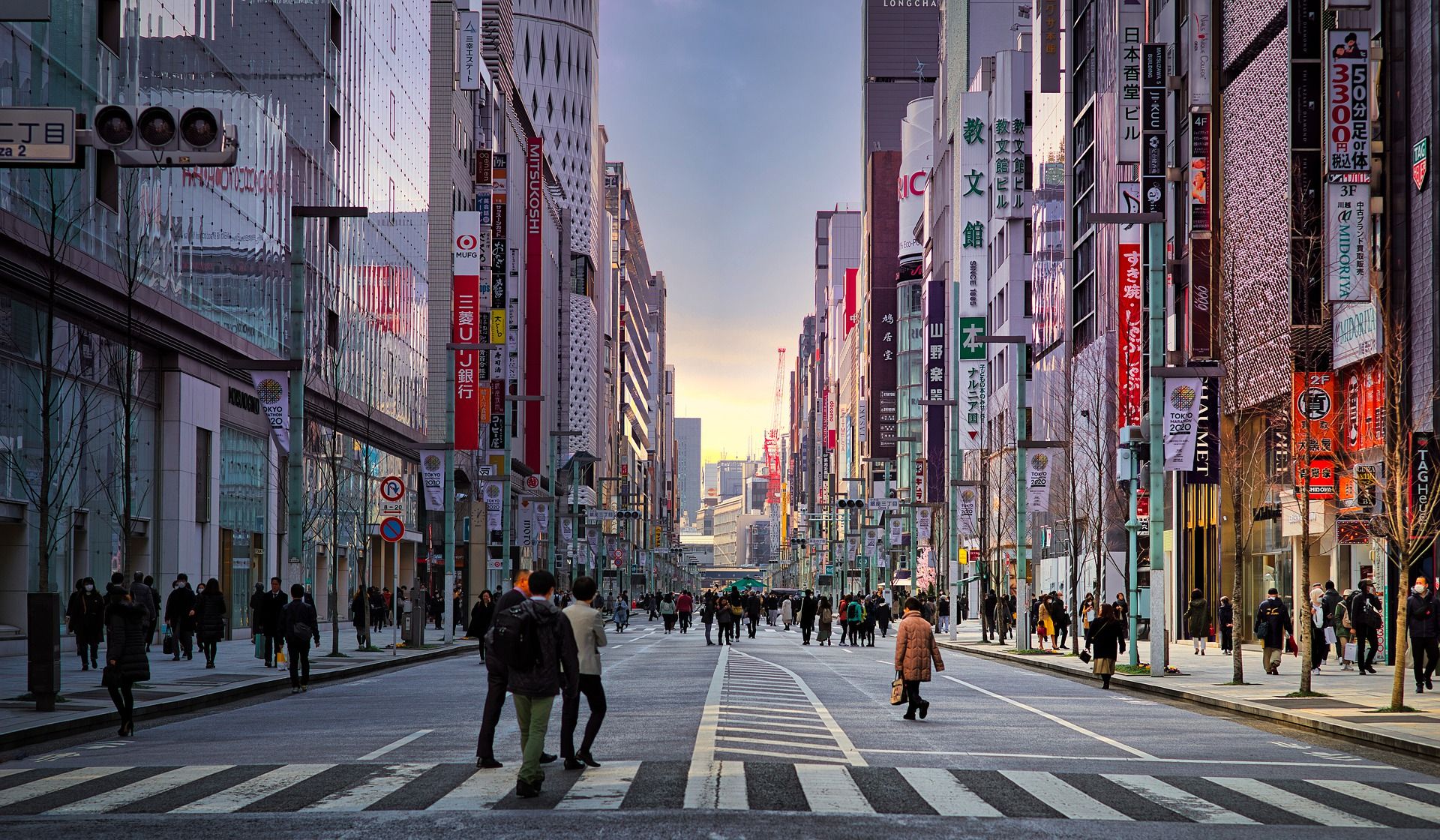
Book Notes:
"The fully developed (and very fortunate) human being working under the best conditions tends to be motivated by values which transcend his self. They are not selfish any more in the old sense of that term. Beauty is not within one's skin nor is justice or order.
One can hardly classify these desires as selfish in the sense that my desire for food might be. My satisfaction with achieving or allowing justice is not within my own skin; it does not lie along my arteries. It is equally outside and inside: therefore, it has transcended the geographical limitations of the self."
“Becoming fully human is about living a full existence, not one that is continually happy.”
“We miss the ocean for the waves.”
“There is something comforting about the fact that we all exist together and have to confront the same existential dilemmas."
“I believe in the fundamental capacity of humans for growth. No matter your current personality or circumstance, I believe that this book can help you grow in precisely the direction you truly want to grow, in your own style, and in such a way that allows you to show the universe that you really existed, and benefited others, while you were here. Let's begin the process of becoming."
“There is a character difference between the man who feels safe and the one who lives his life out as if he were a spy in enemy territory.”
“What has gone so wrong in our society that loneliness is so rampant?"
“The way we are prioritizing our life, and what we are prioritizing, often goes against our greatest need for belonging."
“In cultures that foster face-to-face interactions, people tend to be highly satisfied and live long lives.”
“No one belongs here more than you.”
“What a man can be, he must be.”
“We get the biggest rush of dopamine coursing through our brains at the possibility of reward, but this rush is no guarantee that we’ll actually like or enjoy the thing once we get it.”
“When we can no longer change a situation, we are challenged to change ourselves.”
“Intellectual curiosity predicts the creative achievement of inventions and scientific discovery even better than IQ.”
“We are often so cold to ourselves.”
“Clinical psychology Cindy Meston and evolutionary psychologist David Buss identified 237 distinct reasons why humans have sex.”
“The year was 1954, and it was the last day of classes at Brandeis University. Maslow was delivering one of his riveting lectures, and his students were completely transfixed. In his soft-spoken but intense manner, Maslow encouraged his students to be aware of the totality of their being, including their own unique talents and vast potentialities.
He spoke of responsibility and how it was ultimately up to each of them to become all they could become in life. The students were moved, and many reported feeling an 'almost palpable spirit of inspiration in the room.'
One young woman raised her hand. Maslow looked at her thoughtfully and acknowledged her. 'I'm wondering about the final exam,'' she said. 'Could you give us some idea about the questions on it?'
Every head in the room turned toward this student with a mix of astonishment, shock, and disgust. For the first time in the course, Maslow appeared visibly angry. With a reddened face and vehemence in his voice, he replied: 'If you can ask a question like that at this moment, then I'm concerned about how much you've really understood here this semester."
“The only happy people I know are the ones who are working well at something they consider important.”
“It seems only the neurotic and the unhappy that expend their concern explicitly and directly on their happiness."
“Those with the quietest ego defenses often have the strongest sense of self.”
“You have to be somebody before you can be nobody.”
“Awe is an unusual and complex emotion because it mixes emotions that don't tend to go with each other, such as ecstasy and fear. Studies conducted since that 2003 paper have linked awe with increased life satisfaction, a feeling that there is more time available, increased generosity and helping, and decreased aggressive attitudes. Awe can also affect the way we perceive our bodies, leading us to underestimate their size, temporarily increase religious and spiritual feelings and actions, and temporarily increase both supernatural belief and the tendency to perceive human agency in random events."
“I think an unearned Paradise becomes worthless.”
“Nationalism is dead, although it doesn’t know it yet.”
“We understood what was most important in our lives, and while we were more aware of death than ever, we were also more aware of life than ever."
“When given a choice between living forever alone or dying prematurely surrounded by loved ones, most people choose death."
“I have broken self-actualization—and therefore growth—into three specific needs for which there is strong contemporary scientific support: exploration, love, and purpose. I believe that these three needs capture the essence of how Maslow really conceptualized self-actualization.”
“Human beings can be wonderful out of their own human and biological nature. We need not take refuge in super-natural gods to explain our saints and sages and heroes and statesmen, as if to explain our disbelief that mere unaided human beings could be that good or wise."
“If sometimes it feels as though there are multiple personalities within you that are constantly warring with one another, well, that's because there are multiple personalities within you that are constantly warring with one another!"
“No one else in the entire world has as much potential to become you as you.”
“Through a lifetime of exquisitely intricate interactions among thousands of genes interacting with one another and with the environment, you make decisions that determine your existence. During the process of becoming, you still very much create yourself."
“Healthy transcendence is an emergent phenomenon resulting from the harmonious integration of one's whole self in the service of cultivating the good society."
For more book notes on each individual need, as well as transcendence and more, check out this excellent collection:
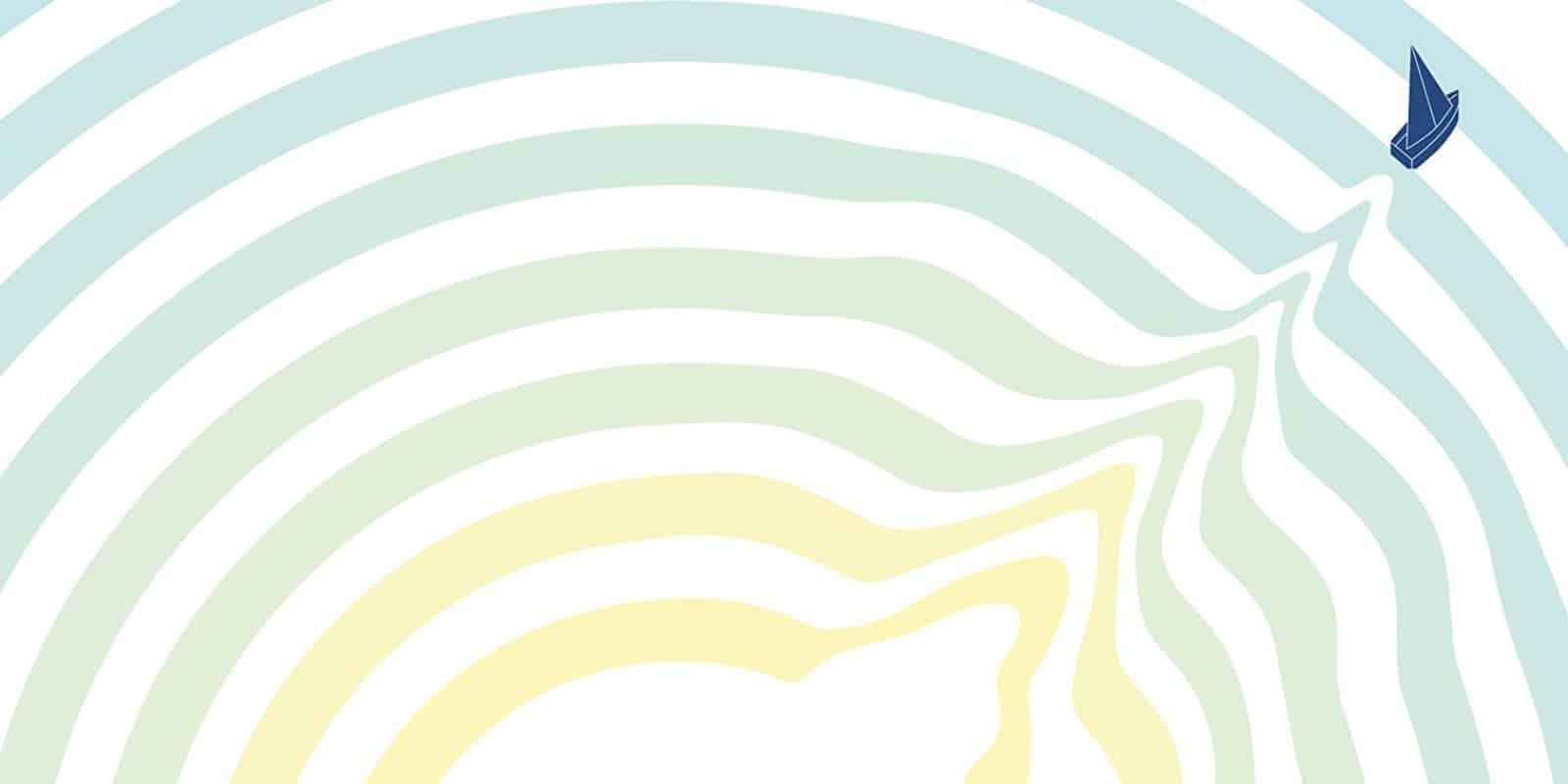
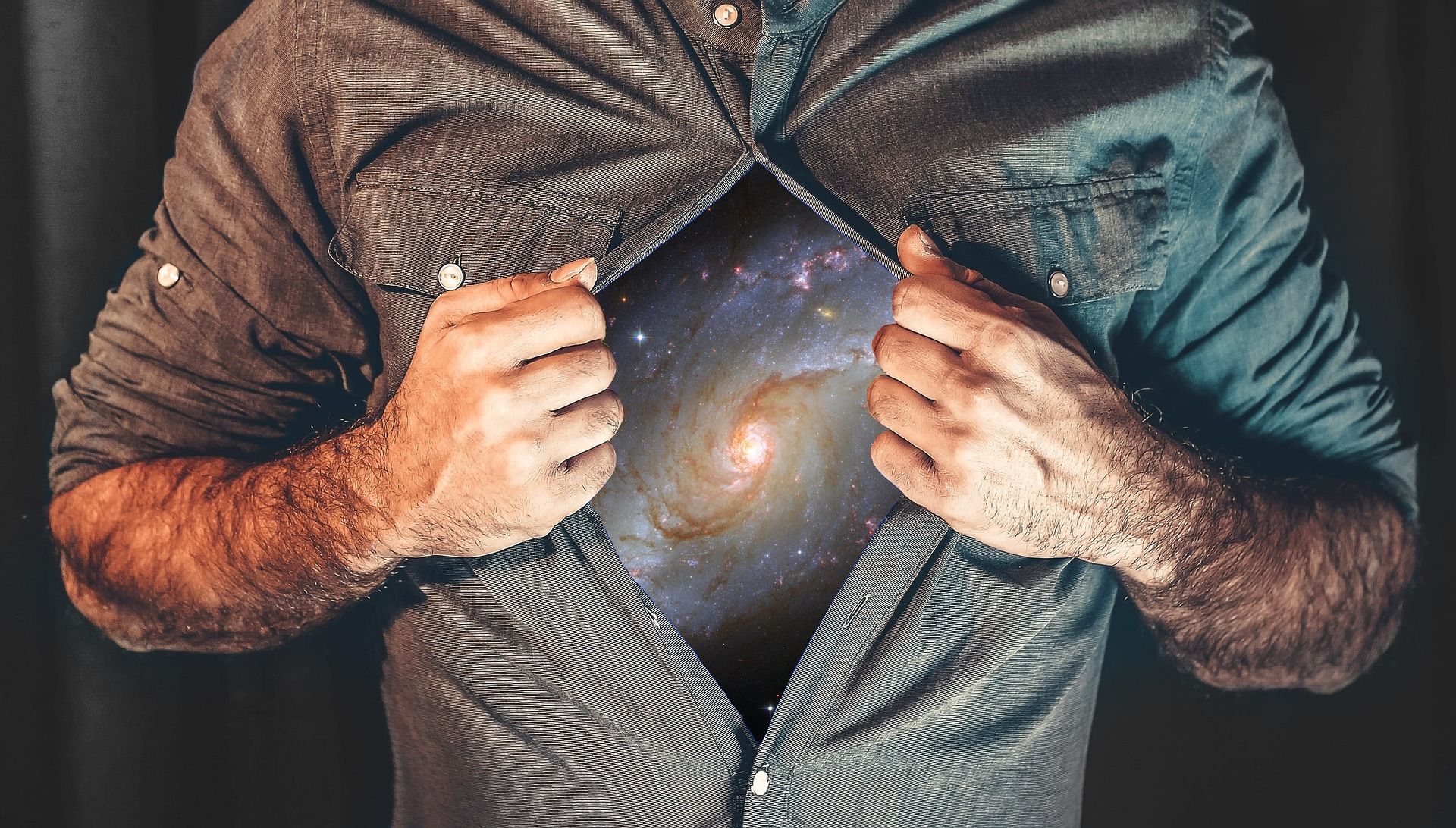
Important Insights from Related Books:
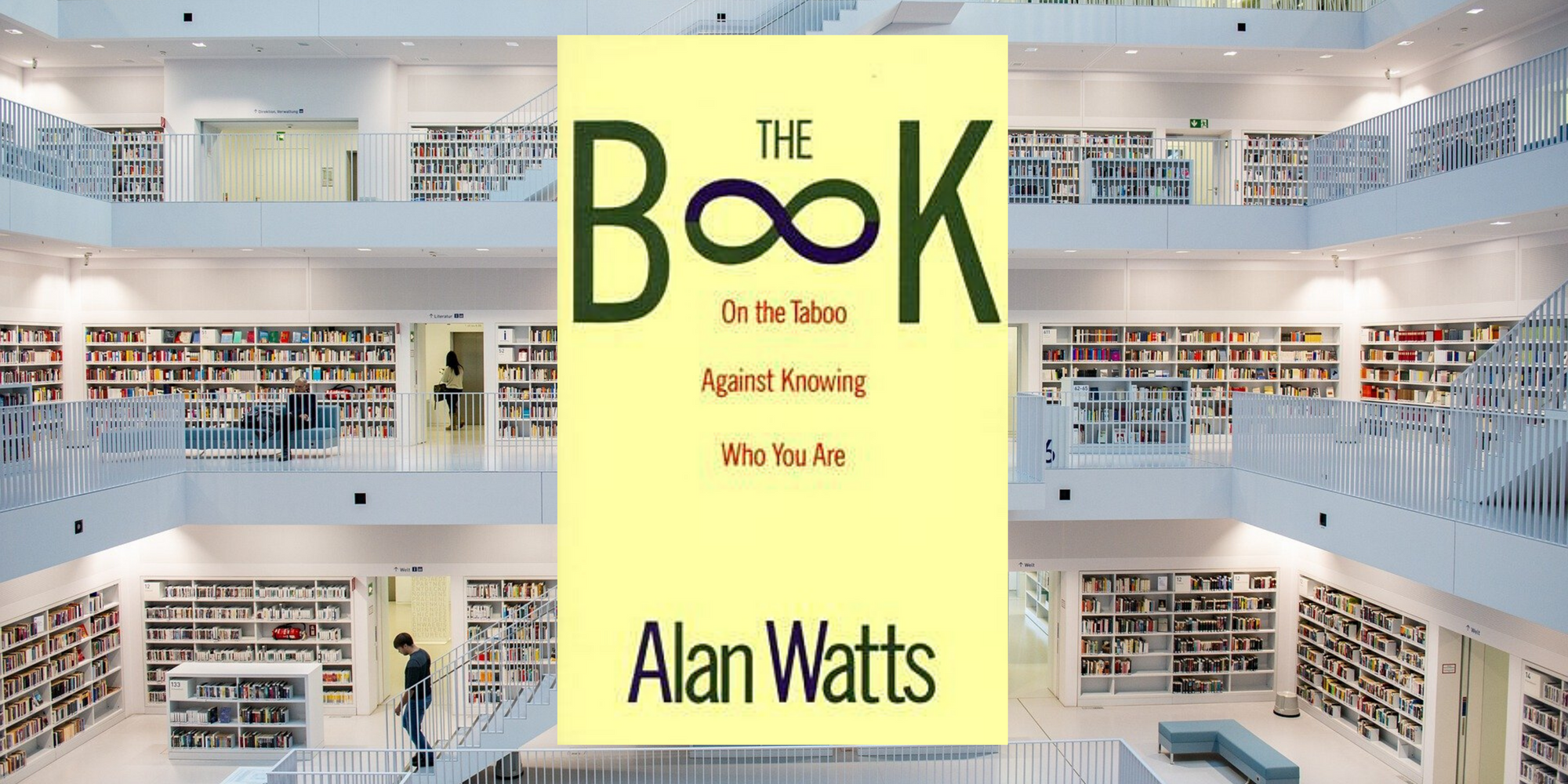
The Book, by Alan Watts:
“We suffer from a hallucination, from a false and distorted sensation of our own existence as living organisms. Most of us have the sensation that "I myself" is a separate center of feeling and action, living inside and bounded by the physical body—a center which "confronts" an "external" world of people and things, making contact through the senses with a universe both alien and strange.
Everyday figures of speech reflect this illusion. "I came into this world." "You must face reality." "The conquest of nature." This feeling of being lonely and very temporary visitors in the universe is in flat contradiction to everything known about man (and all other living organisms) in the sciences.
We do not "come into" this world; we come out of it, as leaves from a tree. As the ocean "waves," the universe "peoples." Every individual is an expression of the whole realm of nature, a unique action of the total universe.
This fact is rarely if ever, experienced by most individuals. Even those who know it to be true in theory do not sense or feel it, but continue to be aware of themselves as isolated "egos" inside bags of skin.”
“Real travel requires a maximum of unscheduled wandering, for there is no other way of discovering surprises and marvels, which, as I see it, is the only good reason for not staying at home.”
“Unless one is able to live fully in the present, the future is a hoax. There is no point whatever in making plans for a future which you will never be able to enjoy. When your plans mature, you will still be living for some other future beyond. You will never, never be able to sit back with full contentment and say, “Now, I’ve arrived!”
“How is it possible that a being with such sensitive jewels as the eyes, such enchanted musical instruments as the ears, and such fabulous arabesque of nerves as the brain can experience itself anything less than a god?”
Read the Full Breakdown: The Book, by Alan Watts
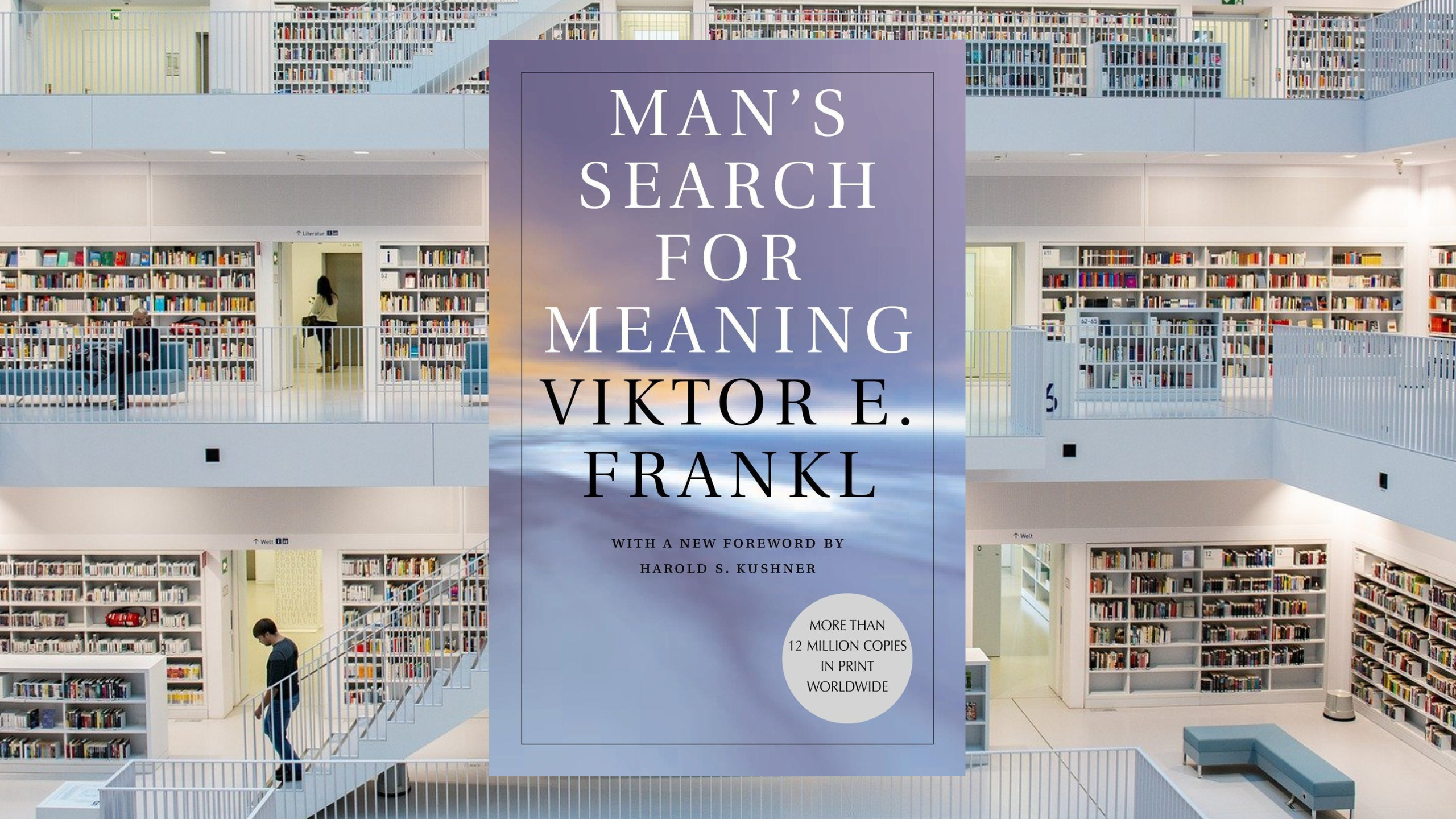
Man's Search for Meaning, by Viktor Frankl:
“Everything can be taken from a man but one thing: the last of the human freedoms—to choose one’s attitude in any given set of circumstances, to choose one’s own way.”
“Ultimately, man should not ask what the meaning of his life is, but rather must recognize that it is he who is asked. In a word, each man is questioned by life; and he can only answer to life by answering for his own life; to life he can only respond by being responsible.”
“What you have experienced, no power on earth may take from you.”
“No one has the right to do wrong, not even if wrong has been done to them.”
This Book on Amazon: Man's Search for Meaning, by Viktor Frankl

The Revolution from Within, by Jiddu Krishnamurti:
"If we take this journey together, and simply observe as we go along the extraordinary width and depth and beauty of life, then out of this observation may come a love...which is a state of being free of all demand...and we may perhaps be awakened to something far more significant than the boredom and frustration, the emptiness and despair of our daily lives."
"It's the mind that is unaware of its own activities that sets up as the authority someone or something external to which we go to help, and we therefore become slaves."
"The mind must be utterly silent. Not asking, not hoping for experience. It must be completely still. Only then is there a possibility of that light which will dispel our darkness."
"Freedom is not at the end; it is at the very beginning."
This Book on Amazon: The Revolution from Within, by Jiddu Krishnamurti
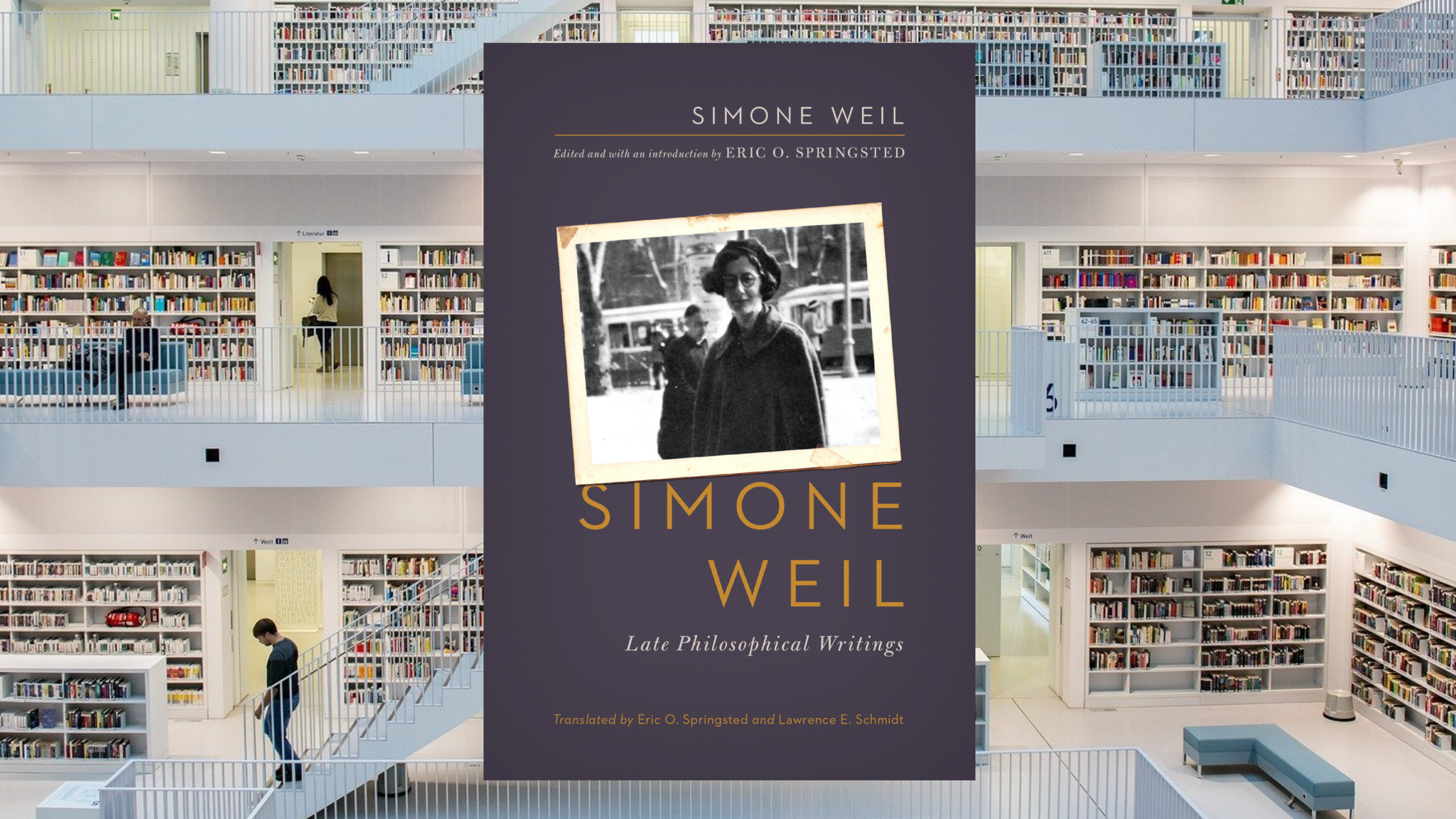
Simone Weil: Late Philosophical Writings, edited by Eric O. Springsted:
"We do not know how to think of truth, beauty, and the good as one, and yet they cannot be thought of separately.
"Whatever we do implies a choice of values, and we are never without values."
"There is not, there cannot be any other relation between a human and God except love. What is not love has no relation to God."
"The evil that is within us is finite, as we are. The good by whose help we fight it is outside us and is infinite. Therefore it is absolutely sure that evil will be vanquished."
This Book on Amazon: Simone Weil: Late Philosophical Writings, edited by Eric O. Springsted
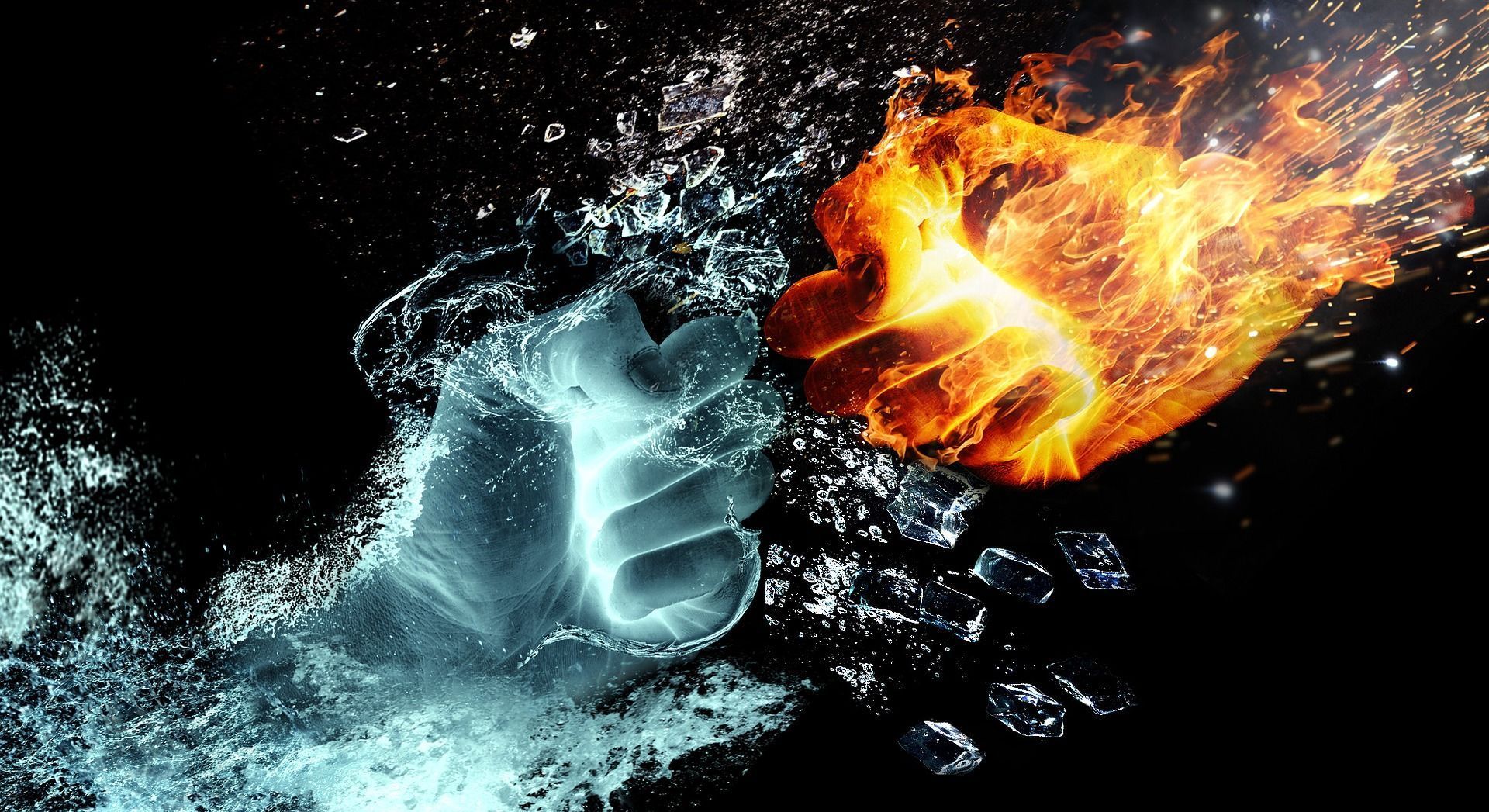
The View from the Opposition:
No one's ideas are beyond questioning. In this section, I argue the case for the opposition and raise some points that you might wish to evaluate for yourself while reading this book.
#1: Is it possible to live without beliefs?
Jiddu Krishnamurti has asked whether it's important - or even possible - to live without beliefs, since the very fact of having any prior beliefs means that you will never discover anything new; instead, everything you experience will just be filtered through this current, underlying belief, and you will never be able to experience the truth, or what Krishnamurti referred to as the "immeasurable."
I have a lot of sympathy for this idea, but, importantly, Krishnamurti didn't offer any definitive answers. He likely never said that "you must live without beliefs"; he only asked whether it was possible.
Like him, I don't offer any conclusions or answers, but I invite you to consider whether it's possible to live without any beliefs, and whether you can ever experience the truth immediately, without the mediation of thought and ideology.
Now, obviously, he didn't mean rejecting the belief that when you press the gas pedal, your car will go faster; he's talking about opinions, ideologies, truth claims, and things of that nature. It's about living without "systems"; living without pyramids and sailboats and even the self.
#2: Pyramids? Sailboats? Waves? How about a Holarchy?
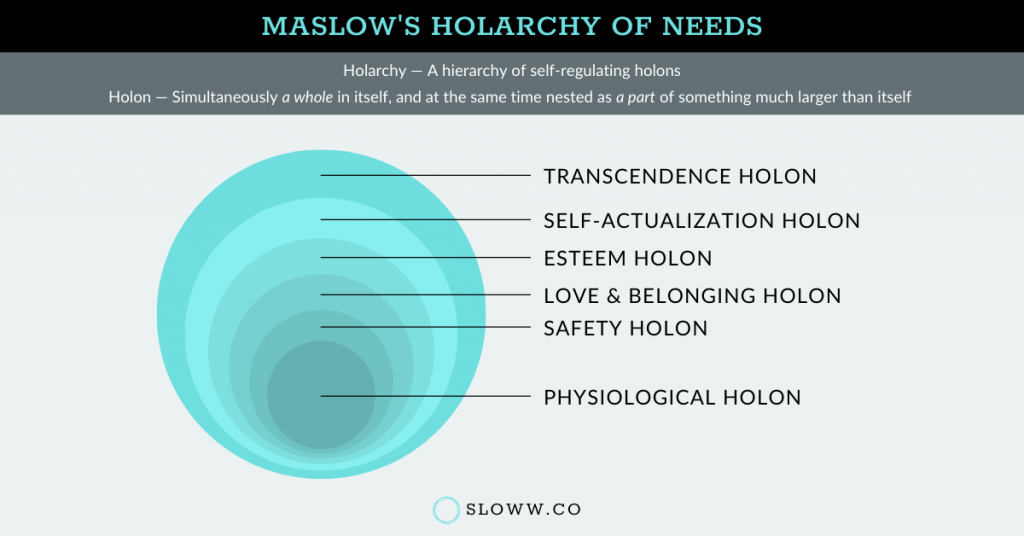
First, some definitions, courtesy of Kyle Kowalski and Wikipedia:
- Holon: “Simultaneously a whole in itself and at the same time is nested within another holon and so is a part of something much larger than itself”; “holons at one level are ‘made up of, or make up’ the holons or parts of another level”
- Holarchy: “a hierarchy of self-regulating holons that function first as autonomous wholes in supra-ordination to their parts, secondly as dependent parts in sub-ordination to controls on higher levels, and thirdly in coordination with their local environment”
- Holarchic Relationship: “subatomic particles ↔ atoms ↔ molecules ↔ macromolecules ↔ organelles ↔ cells ↔ tissues ↔ organs ↔ organisms ↔ communities ↔ societies”
This is another model that has been proposed, and it gets at the idea that each need, each "holon" isn't just satisfied once and forgotten about forever and ever. Maslow and Kaufman recognized this, of course, but this model has merit as well.
It's not that we achieve physiological safety one day and suddenly have a perfectly functioning boat for the rest of our lives - we need to keep satisfying more basic needs, as we keep adventuring outward from our secure base.
If you want to go deeper into this idea of holons, I can recommend A Theory of Everything, by Ken Wilbur, a book that's about 140 pages long, but took me longer to read than Don Quixote.
#3: A warning about spiritual narcissism.
Just a quick word about viewing the "progress" of others. It's incredibly tempting to believe that the higher up the pyramid - or the holarchy - we go, the more "evolved" we are, or some other nonsense. When in reality, we rise or fall together, and just because someone is grappling with safety or esteem needs, for example, it doesn't mean that they are of "lesser" worth, or that they're not as "advanced" as anyone else. I don't think that you'd ever believe that, but it has to be said!
"The test of a first-rate intelligence is the ability to hold two opposed ideas in the mind at the same time and still retain the ability to function.”
-F. Scott Fitzgerald

Action Steps:
So you've finished reading the book. What do you do now?
#1: Take on these 28 growth challenges!
Scott Barry Kaufman and Jordyn Feingold have put together a 59-page PDF accompaniment to their online course, Transcend!, which includes 28 separate growth challenges that you can return to, again and again throughout your life, in order to stretch yourself and fulfill your highest human potential. You can access the growth challenges PDF here!
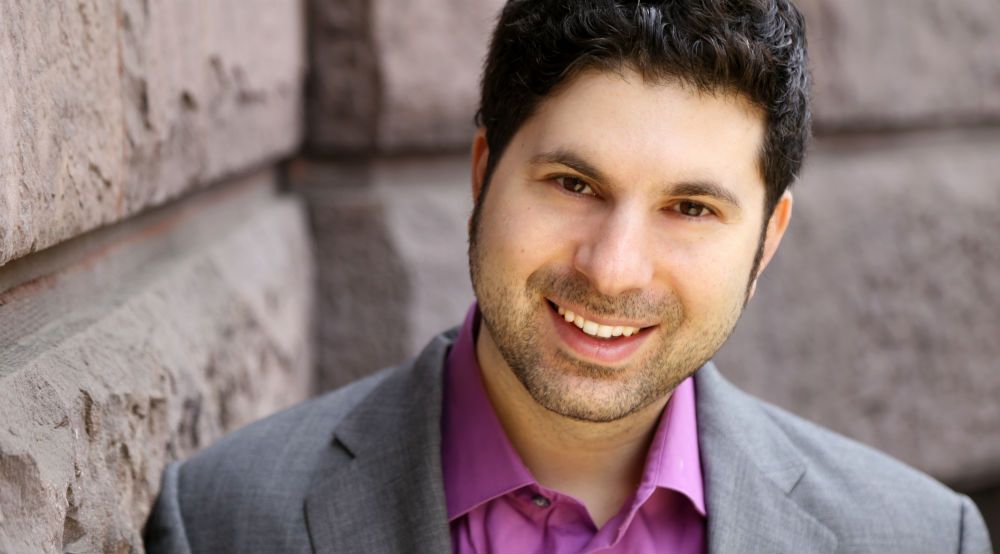
About the Author:
Scott Barry Kaufman is a cognitive scientist and humanistic psychologist exploring the mind, creativity, and the depths of human potential. He is the founder and director of the Center for the Science of Human Potential and an Honorary Principal Fellow at the University of Melbourne’s Centre for Wellbeing Science. Dr. Kaufman has taught at Columbia University, Yale, NYU, the University of Pennsylvania, and elsewhere.
Dr. Kaufman hosts The Psychology Podcast, which has received over 20 million downloads and was included in Business Insider’s list of “9 podcasts that will change how you think about human behavior.” He is interested in using his research to help all kinds of minds live a creative, fulfilling, and self-actualized life, and in 2015, he was named one of “50 groundbreaking scientists who are changing the way we see the world” by Business Insider.
Dr. Kaufman’s writing has appeared in The Atlantic, Scientific American, Psychology Today, and Harvard Business Review, and he is the author and editor of 9 books. He has received a B.S. in psychology and human-computer interaction from Carnegie Mellon, an M. Phil in experimental psychology from the University of Cambridge under a Gates Cambridge Scholarship, and a Ph.D. in cognitive psychology from Yale University.
Additional Resources:
28 Growth Challenges from Transcend
Abraham Maslow - Beyond the Hierarchy of Needs
Manifesto for a Human-Centered Education
Scott Barry Kaufman on Twitter
This Book on Amazon:
Transcend, by Scott Barry Kaufman
If You Liked This Book:
Wired to Create, by Scott Barry Kaufman
Toward a Psychology of Being, by Abraham Maslow
A Theory of Human Motivation, by Abraham Maslow
The Farther Reaches of Human Nature, by Abraham Maslow
The Revolution from Within, by Jiddu Krishnamurti
Man's Search for Meaning, by Viktor Frankl
Yes to Life: In Spite of Everything, by Viktor Frankl
Meditations, by Marcus Aurelius
Simone Weil: Late Philosophical Writings, edited by Eric O. Springsted
The Alchemist, by Paulo Coelho
Modern Man in Search of a Soul, by Carl Jung
On Becoming a Person, by Carl Rogers
